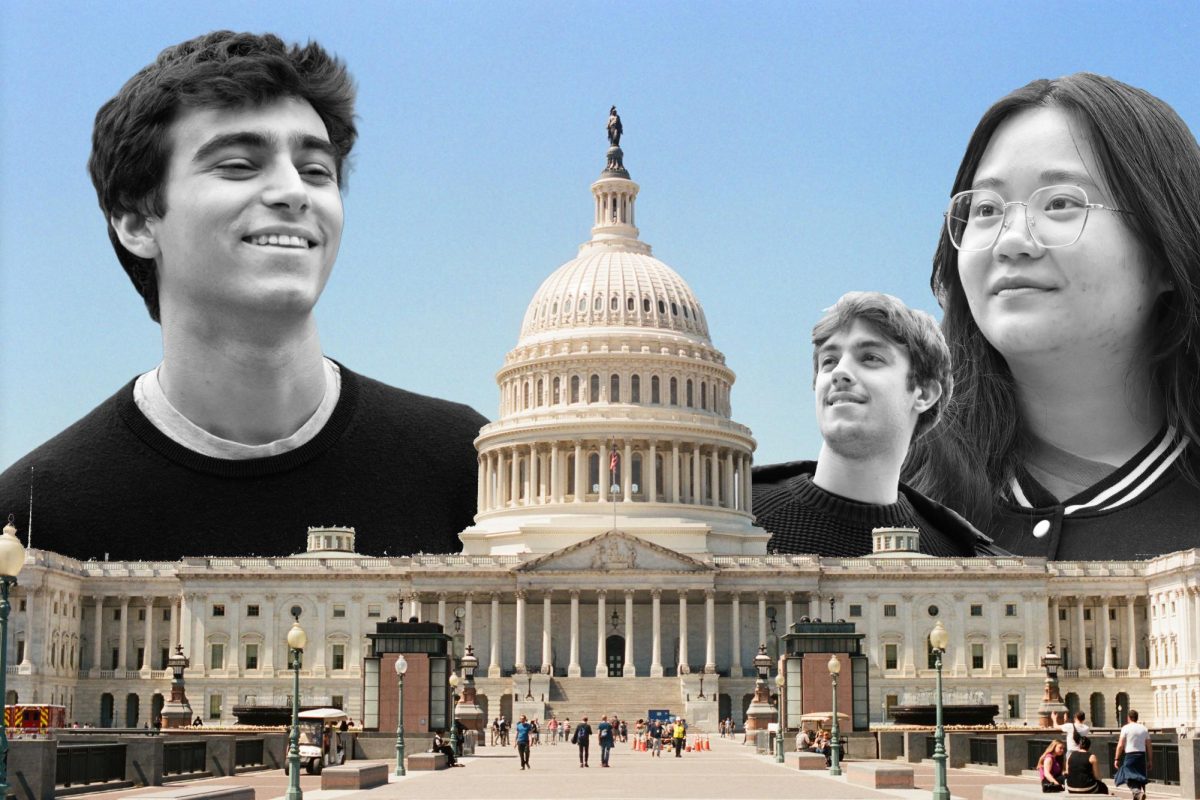When one student first moved to the United States to attend Fordham University, she found out firsthand the vast economic difference between the U.S. and her native country, Vietnam.
“Going out to have a banana or have some bread costs as much as a whole meal back in our home country,” Linh Hoang, Gabelli School of Business at Lincoln Center (GSBLC) ’28, said.
Economic concerns like Hoang’s are a major issue in this presidential election. In the Vice Presidential Debate on Oct. 1, CBS News Anchor Norah O’Donnell asked Governor Tim Walz if Harris’ economic plan will work without increasing “the nation’s deficit by 1.2 trillion dollars.”
In this shared space on campus, the contrast is stark: Domestic students are driven by their visions for a promising future, while international students navigate an intricate landscape of uncertainty, their hopes entwined with outcomes decided by others.
Hoang said she can see how rising prices could personally impact her. “I may have to choose between working extra hours,” Hoang said. “Or focusing on my studies.”
Like many other international students, Hoang does not have the ability to cast a vote for who will be in charge of her future in the U.S. — despite the implementation of future policies that could affect her directly.
Almost 15% of Fordham University’s 17,000 students are international students — and they often echo a unique urgency on political matters. In this shared space on campus, the contrast is stark: Domestic students are driven by their visions for a promising future, while international students navigate an intricate landscape of uncertainty, their hopes entwined with outcomes decided by others.
As Fordham’s campuses buzz about the upcoming election, these students — who come from every corner of the globe — are aware of the stakes involved. Reflecting the political anxiety of some U.S. citizens, international students said that this election raises concerns about their hopes and fears for an uncertain future.
Studying abroad in the U.S. is a complicated process for many international students. First, students must be accepted to a university, then apply for the Student Exchange Visitor Program (SEVP), a program within The Department of Homeland Security (DHS). The SEVP manages the students trying to obtain an F visa, commonly referred to as a “student visa.”
An interview process comes next. It often includes a sit-down meeting with the U.S. embassy in the student’s country of origin. They answer questions regarding their school of choice, how long they want to stay in the U.S., and whether the student meets “the requirements under U.S. law to receive a visa,” as phrased by the Department of State.
After this lengthy process, international students also face a lack of opportunities when it comes to the work environment because of the difficulty of obtaining a work-visa post-graduation. One immigration reporter argued in Forbes that Donald Trump, if re-elected, can be expected to restrict employment-based visas.
Records from the DHS in 2022 show that under the Trump administration, the amount of new Legal Permanent Residents in the U.S. decreased. In the most recent available data from the DHS, the amount of new green-card holders has increased under the Biden administration.
One of the many focuses on Kamala Harris’ campaign is border and immigration control. Her website states that the “immigration system is broken and needs comprehensive reform that includes strong border security and an earned pathway to citizenship.”
Regardless of different policies between the two major parties, both domestic and international media outlets have said this political era has seen a proliferation of polarization and prejudiced rhetoric.
Regardless of the range of policies some international students are not planning to seek permanent residency status. Nastasia Baic, Fordham College at Lincoln Center ’28, a student from Serbia, is one of them. Baic said that her post-graduation plans also shape how she thinks about immigration.
“I feel that everyone should be allowed to come into the country legally,” Baic said. However, she said she believes that “they need to be regulated to live as citizens.”
Regardless of different policies between the two major parties, both domestic and international media outlets have said this political era has seen a proliferation of polarization and prejudiced rhetoric.
One writer for The Guardian wrote that Trump’s message “amplifies existing xenophobic beliefs within the American psyche as a means of political gain.”
When it comes to the legislature, Pew Research Center has found that Democrats and Republicans in Congress, on average “are farther apart ideologically today than at any time in the past 50 years.”
A report from NBC News in 2023 states that “it’s undeniable that the United States has become more politically polarized than it was a decade ago — as well as a decade before that.” The political divide in the U.S. has been growing leading to a dramatic split in the approval rates of the U.S. presidents. In 1948, before Truman ran for a full term, his approval from the Democrats was 68% and from Republicans 50%. During Biden’s 2020 Presidency, 72 years later, the political climate was vastly different with only 6% of Republican approval and 83% of Democrat.
When it comes to the legislature, Pew Research Center has found that Democrats and Republicans in Congress, on average “are farther apart ideologically today than at any time in the past 50 years.”
And Americans, too, have seen polarization play out in a different way. “Despite agreeing on much,” The Economist reported in 2021 that,“Americans dislike each other more than ever.”
Despite New York City’s status as one of the most diverse cities in the world, racism is still present and often felt by international students. Om Madhavi, GSBLC ’28, an international student from India, expressed his concerns regarding his safety in the city.
Stephen Danev, GSBLC ’28, a student originally from Canada said he follows the election with fascination without carrying much concern for what it entails.
“Because of the election rhetoric, people might have different perceptions towards international students, sometimes being more discriminatory,” Madhavi said. Whenever he ventures off campus, “I might experience some form of discrimination — which I’m a bit scared of,” Madhavi said.
Another international student, Alejandra Velascoc, GSBLC ’28, explained that this high-tension atmosphere impacted how she behaves in public as well.
“I have to be more conscious of my environment and what I’m doing and how I’m behaving, even if I’m not doing anything wrong, because of the fear of possibly getting into trouble and getting my student visa revoked,” Velascoc said.
Stephen Danev, GSBLC ’28, a student originally from Canada said he follows the election with fascination without carrying much concern for what it entails.
While many Americans focus on the effects of the election by analyzing mostly domestic policies, some international students are aware that U.S. foreign policy has a major impact on political affairs worldwide.
“I’m very excited to see how it all turns out. It seems to be very interesting. I feel for international students, it’s not as real as it is for the Americans because it doesn’t affect us in the same way it affects them,” Danev said.
Can Metin, GSBLC ’27, who is originally from Turkey, but grew up in the Netherlands, said he’s mostly interested in the impact this election will have on the rest of the world.
“I am quite intrigued to see the outcome and the potential socioeconomic effects that it could have,” Metin said. “It’s really interesting to see that a lot of my American friends are very much engaged with the election itself.”
While many Americans focus on the effects of the election by analyzing mostly domestic policies, some international students are aware that U.S. foreign policy has a major impact on political affairs worldwide.
International students live under the daunting tension of not being able to vote in the country in which they reside. Students like Hoang said they listen intently to their peers when discussing their voting plans — all with the knowledge that they themselves cannot cast a ballot.
“It would definitely affect us. We don’t have a say on who would win the election or what policies would be implemented on our immigration status,” Hoang said. “It definitely worries us.”
Despite their ineligibility to vote, some international students experience the same stakes as their domestic peers — and will be watching the election just as intently.


![VIS #2 [Credit_ Kei Sugae _ THE OBSERVER]-min](https://fordhamobserver.com/wp-content/uploads/2024/11/VIS-2-Credit_-Kei-Sugae-_-THE-OBSERVER-min-1200x800.jpg)
